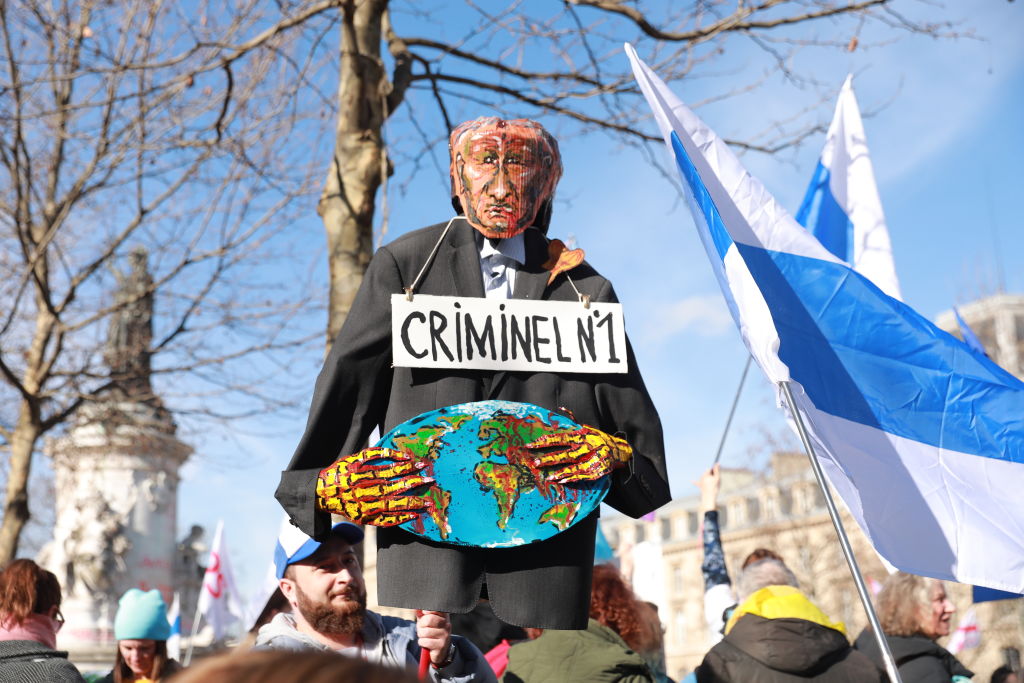
On Easter Sunday in 2022, a missile strike shattered a quiet town in Ukraine, Donetsk region. In the aftermath, Oksana, 40, was left clinging to life, her husband and young son killed in an instant. The following January, in Dnipro, a 23-year-old named Anastasia lost her parents in a missile attack on their apartment building. She had already lost her fiancé to the war. By September 2024, another family was obliterated, this time in Lviv: Yaroslav’s wife and three daughters were killed in their home by yet another Russian missile.
[time-brightcove not-tgx=”true”]
These tragedies are not aberrations. They are the brutal, everyday reality of a nation under siege. Behind the names and dates lie lives undone, futures erased.
Three years after Russia launched its full-scale invasion, justice is now the rallying cry of millions of Ukrainians. It is about accountability, ensuring that those who orchestrated this invasion are held responsible, and deterring others who might dare to follow Vladimir Putin’s example. It is also urgent as President Donald Trump vows to end the war and begins negotiations with Russia.
But justice is far from straightforward. The war in Ukraine has exposed profound fault lines in the international legal order, challenging its capacity to deliver on its most basic goal.
As world leaders and legal scholars debate how to respond, two primary paths have emerged. The first envisions a tribunal focused specifically on the crime of aggression—the deliberate decision to launch an unjust war. The second proposes a hybrid mechanism, one that would address the full spectrum of international crimes stemming from the Russian invasion, from war crimes to crimes against humanity.
The foundations have been laid to establish a special tribunal to try Russia for the crime of aggression against Ukraine, the E.U. said earlier this month. But this approach contains a significant gap. While well-intentioned, this approach risks framing justice as a European issue rather than a universal imperative.
Read More: Inside Ukraine’s Push to Try Putin for War Crimes
Russia has already seized on this detail. At the BRICS summit in October, Moscow portrayed global justice efforts as a Western plot, pitting the so-called Global South against the West. A regional tribunal might inadvertently play into this narrative, further polarizing the world.
For justice to carry the weight it must, it cannot be regional. It must be global. That means forging a coalition broad enough to lend legitimacy to the endeavor—one that includes nations from every corner of the world.
Modern international law emerged from the wreckage of world wars. After World War I, early attempts at accountability—like the Leipzig Trials—offered valuable lessons, albeit limited by weak legal frameworks. World War II brought the Nuremberg and Tokyo Tribunals, which were groundbreaking in their scope and symbolic power. Nevertheless, these efforts were fundamentally tied to the dynamics of victory: the Allies judged the Axis.
Ukraine’s situation is different. If the war ends in agreements or a frozen conflict, neither side will feel like a true winner or loser. Instead, it may culminate in an uneasy settlement, leaving justice adrift in uncharted waters. Compounding the challenge is Russia’s nuclear brinkmanship, which casts a long shadow over international decision-making.
Ukraine’s allies face a critical question: Will they prioritize justice, even if it complicates peace? Or will they ask Ukraine to set aside its quest for accountability in exchange for a fragile ceasefire? These concerns are especially pressing in the context of Ukraine’s exclusion from what is increasingly being framed as the negotiating process.
Read More: Ukraine Needs a Ceasefire Now
The U.S. has an ambivalent relationship with international criminal justice. At times, it has actively opposed the International Criminal Court, even resorting to sanctions—a move that directly undermines the fundamental principle of justice: holding perpetrators of international crimes accountable. Such actions create opportunities for Russia and other states to further discredit international law and weaken the global security system.
Now, the U.S. must decide whether it will lead or lag. A global tribunal for Ukraine offers America an opportunity to reaffirm its commitment to the rule of law and to counter Russia’s narrative of Western hypocrisy. However, doing so requires clarity of purpose and a willingness to embrace the messy, often frustrating, process of building international consensus.
This is not just Ukraine’s fight. It’s a litmus test for the entire international system. Can it adapt to address the realities of a multipolar world where aggressors are not easily subdued? Can it balance the demands of peace with the imperative of accountability?
Justice, in this context, is not merely an abstract ideal. It’s the bedrock of any durable peace. Without it, the scars of this war—on Ukraine, on Europe, on the international order—will fester.
For justice to succeed, it must transcend borders. It must reflect a shared commitment to a world where sovereignty is sacrosanct, where power is constrained by law, and where no nation is too mighty to be held accountable. And it must acknowledge that justice is not something that can be bargained with.
The stakes couldn’t be higher. Ukraine’s call for justice is also a call to the world: to choose the rule of law over the rule of force, to build systems that protect the weak against the strong, and to ensure that, even in the darkest times, accountability prevails.
This is a moment of reckoning—not just for Ukraine but for all of us.

